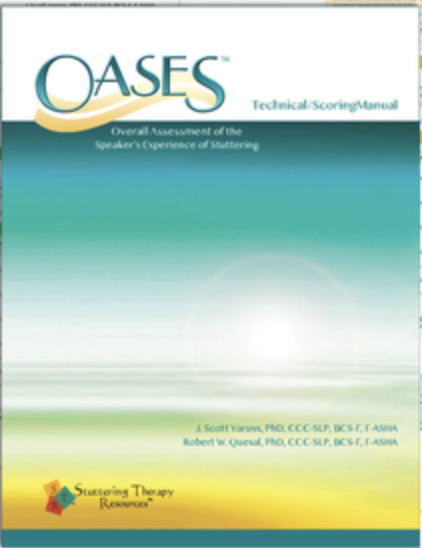Giving the OASES
The Overall Assessment of the Speaker’s Experience of Stuttering (OASES) is a comprehensive tool that is administered to measure a client’s perceptions of observable stuttering behaviors, reactions to stuttering, and difficulties in performing daily tasks involving communication. It can be used with children as young as age 7.

It’s a great companion for the Stuttering Severity Instrument (SSI), which measures the frequency, duration, secondary behaviors, and naturalness of an individual’s speech. I have created report templates for both fluency evaluations that you can view here.
OASES Areas of Assessment
The client completes a self-rating form about their current experiences with a given scale of 1-5. These scales vary in each section (e.g., 1= always, 5= never; 1= not at all hard, 5= extremely hard). There are five areas:
- Section I. General Information: Assesses speaker’s perception of their disfluencies and overall impressions of their speaking abilities as a stutterer
- Section II. Reactions to Stuttering: Assesses the speaker’s affective reactions (i.e., guilt, embarrassment), behavior reactions (i.e., tension, avoidance), and cognitive reactions (i.e., beliefs about speaking and stuttering)
- Section III. Communication in Daily Situations: Assesses the speaker’s ability to speak in daily situations (i.e., under time constraints, in small groups, over the phone)
- Section IV. Quality of Life: Assesses the speaker’s satisfaction with their ability to communicate in daily situations
- Section V. Overall: Impact scores are totaled and converted to a total score to provide an overall impact of disfluencies on the child

Scoring the OASES
The evaluator follows the formula on the protocol to come up with an impact score, which correlates to an impact rating of mild, mild/moderate, moderate, moderate/severe, and severe.
Mild Impact
In mild cases, client’s perceive their disfluency to have a limited impact on their life. They might experience mild self-consciousness or frustration during communication, but it does not significantly impair their social or occupational functioning. Speakers don’t typically avoid speaking or social situations.
Moderate Impact
In moderate cases, stuttering can have a more perceived noticeable impact on a client’s life. Communication challenges might emerge in specific situations, such as speaking on the phone, giving presentations, or engaging in conversations. Speakers may face increased self-consciousness, anxiety, and frustration during speaking situations and may even avoid some social or speaking situations.
Severe Impact
In severe cases, client’s perceive their disfluency to have a significant impact on their life across multiple domains. Individuals may experience significant anxiety, shame, and social isolation due to their speech difficulties. Their personal relationships, educational pursuits, and professional opportunities may be profoundly affected. Daily activities, such as making phone calls, participating in meetings, or even ordering at a restaurant, can become highly challenging. In some cases, individuals may experience limited participation in social activities or avoidance of situations that trigger their speech difficulties.
For more info on report writing, check out these resources- ⬇️
Blog post: Write a Great Speech and Language Report
FREE course: Write Speech and Language Reports Like a Boss
